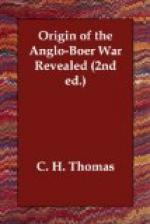Africa has for some thousands of years been the enemy’s favourite and undisturbed haunt for his gory orgies, for the hecatombs of millions of immolated victims each year, the teeming recruiting preserve for his contingents.
Is he likely to surrender it all to an invading beneficent operation? Will he not rather continue a most determined and desperate resistance and oppose the most advanced of his subtle devices? The malignant power of his agencies is ever and anon manifest—if restrained in one direction his sway is doubly asserted in another. While the Boer war is proceeding a diversion upon a large scale is being effected in Asia which may result in deferring progress in Africa, or history may be brought to repeat itself by the production of some African Attila or Grenseric or a Saladin or another Moselikatse or Mahdi, whose overrunning hordes will efface all the good work thus far done and restore conditions in accord with his murderous sway, whilst at the same time revelling over the ominous developments looming in Europe and America for the production of giant strikes and other imminent socialistic outbursts which could all be prevented, or at least staved off for a long time, if the existing immense spheres for civilizing outlets could only be peaceably utilized.
FOOTNOTES:
[Footnote 13: One of those enterprises is the railway which is to connect the Cape with Cairo.]
[Footnote 14: Pro-Boer Propaganda is persisting in designating England as answering to that prophetic image destined to signal destruction.]
RELIGION
The old voortrekkers who emigrated from the Cape Colony all belonged to the Dutch Reformed Protestant persuasion. With very little learning, the Bible, catechism, and the orthodox “psalm and hymn-book” constituted their sole means for building up their faith. The scope of their education was likewise limited to these simple aids during their chequered wanderings for nearly twenty years, proving ample, however, in preserving themselves and children from the tendencies of receding into barbarism. The Bible was the recognised reference and guide in private and public affairs, and it is so still. It is, indeed, notable with what wisdom and prudence those simple people managed to frame their treaties with native potentates, their conventions with the Portuguese and the British Governments, and, finally, in compiling their own constitutions. Their experiences teem with incidents of extreme sufferings, dangers, and reverses, and also with many signal deliverances, which all operated in deepening religious fervour and dependence upon the Almighty.
Their vicissitudes led them to make analogous comparisons with ancient Jewish history. This practice resulted in some erroneous conceptions, notably in regard to their relations with aborigines and general native policy, as referred to in previous chapters. It also imperceptibly fostered sentiments confounding legality with grace, and the by-product of that subtle corrupting leaven which is apt to see a splint in the eye of another whilst unmindful of the beam in one’s own.




